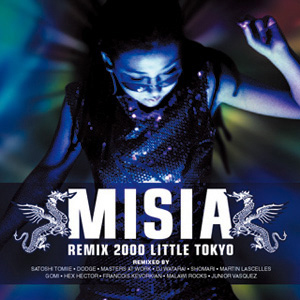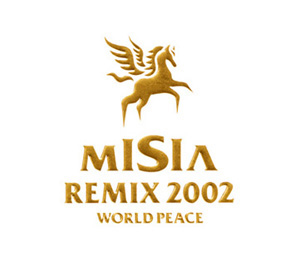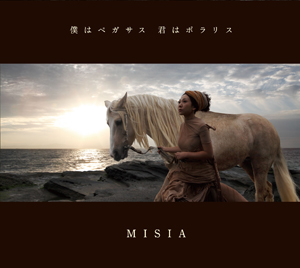
Misaki Itō, commonly known as Misia and stylized as MISIA, is a Japanese singer and songwriter. Born in Nagasaki, Misia moved to Fukuoka at the age of 14 to pursue a recording career. There, she continued her secondary education and briefly attended Seinan Gakuin University before withdrawing to focus on her musical career. She was signed to BMG Japan in 1997, after auditioning for record producer Haruo Yoda.

The discography of Japanese R&B singer Misia consists of nine studio albums, three compilation albums, one extended play (EP), one live album, six remix albums, twenty-six singles, twelve promotional singles, eighteen video albums and thirty-seven music videos. In 1997, Misia signed a recording contract with BMG Japan and joined the then up-and-coming talent agency, Rhythmedia. Under the sub-label Arista Japan, Misia released her first single, "Tsutsumikomu Yō ni..." in February 1998, followed by "Hi no Ataru Basho" in May. In June, her debut album, Mother Father Brother Sister, opened at number three on the Oricon chart. The album peaked at number one three weeks later and stayed in the top five for eleven consecutive weeks. Mother Father Brother Sister was certified double million and won a Japan Record Award for Best Album, as well as a Japan Gold Disc Award for Pop Album of the Year. In 2000, Misia's second studio album, Love Is the Message, debuted at number one and was certified double million. It won a Japan Record Award for Best Album and a Japan Gold Disc Award for Pop Album of the Year. The album spawned three top ten hits: "Believe," "Wasurenai Hibi" and "Sweetness." Misia's first remix album, Misia Remix 2000 Little Tokyo, was released three months later and shot to number one. It sold over 800,000 copies and is the second best-selling remix album of all time in Japan.

"Luv Parade/Color of Life" is the fifteenth single by Japanese recording artist Misia. It was released on July 5, 2006 as the first single from Misia's seventh studio album Ascension.

Misia Remix 2000 Little Tokyo is the second remix album of Japanese R&B singer Misia, released on April 19, 2000. It debuted atop of the weekly Oricon albums chart with 234,190 copies sold. Misia Remix 2000 Little Tokyo is the second highest-selling remix album of all time in Japan, succeeding TRF's Hyper Mix 4.

Misia Remix 2002 World Peace is Misia's third remix album, released on November 21, 2001. It sold 165,190 in its first week and peaked at #3. Misia Remix 2002 World Peace features Erick Morillo's first remix for a Japanese artist.

Misia Greatest Hits is Misia's first compilation album and last release with Arista Japan, released on March 3, 2002. It sold 587,210 copies in its first week and peaked at #1 for two consecutive weeks. Misia Greatest Hits was the highest selling compilation album of 2002. It is the 30th best selling compilation album and 90th best selling album overall of all time in Japan. The album includes an enhanced music video for the unreleased track, Amai Koibito, featuring Melonpan.

Kiss in the Sky is Misia's fourth studio album and first under Avex Trax subsidiary label Rhythmedia Tribe, released on September 26, 2002. It sold 410,060 copies in its first week and peaked at #1 for two consecutive weeks. Like her previous album, Marvelous, Kiss in the Sky was produced by Misia herself and features collaborations with B'z guitarist and leader, Tak Matsumoto.

Hoshizora no Live: The Best of Acoustic Ballade is Misia's first live album, released on October 22, 2003. It sold 72,351 copies in its first week and peaked at #2. The album features live recordings of Misia's outdoor acoustic concert held in Okinawa on August 15 and 16, 2003.

"Any Love" is the seventeenth single by Japanese recording artist Misia. It was released on July 4, 2007 as the first single from Misia's eighth studio album Eighth World.

Eighth World is Misia's eighth studio album and first since signing back with BMG Japan, released on January 9, 2008. It includes the singles "Any Love" and "Royal Chocolate Flush" as well as the J-Wave Winter Campaign Holy December, Be in Love with J-Wave image song and theme song to the Japanese release of the movie Bridge to Terabithia, "To Be in Love". The first pressing of the album came in a sleeve case packaging.

"Flying Easy Loving Crazy" is a song recorded by Japanese singer-songwriter Toshinobu Kubota and Japanese singer Misia for Kubota's fifteenth studio album Timeless Fly. It was released by Mastersix Foundation as the album's second single on March 26, 2008.

"Yes Forever" is the nineteenth single by Japanese recording artist Misia. It was released on April 30, 2008 as the first single from Misia's ninth studio album Just Ballade.

"Catch the Rainbow" is the twenty-first single by Japanese recording artist Misia.

Decimo X Aniversario de Misia: The Tour of Misia 2008 Eighth World + The Best DJ Remixes is the fifth remix album by Japanese R&B singer Misia, released June 25, 2008. The release is a two-disc combination of The Tour of Misia 2008 Eighth World DVD and a remixes compilation, The Best DJ Remixes. The Tour of Misia 2008 Eighth World was also simultaneously released as a stand-alone Blu-ray.

Do You Dreams Come True? is Dreams Come True's fifteenth studio album. It was released on March 21, 2009, which coincides with the release of their debut single in 1989. It was released in three formats: Regular edition, limited edition A (2CDs) and limited edition B (CD+DVD). The album reached the top spot on the weekly albums chart despite having been on sale for only four days, giving them their twelfth number-one album and setting the record for most number-one albums by a female vocal group; putting them ahead of the late Zard and Every Little Thing. On its third week the album rose back to number one, their first album in fourteen years to do so.

"Ginga/Itsumademo" is the twenty-second single by Japanese recording artist Misia. It was released on June 10, 2009 as the third single from Misia's ninth studio album Just Ballade.

Ayaka's History 2006–2009 is Ayaka's first compilation album, released on September 23, 2009. The album was released in three versions: 2CD+DVD (limited), 2CD+Photo book (limited) and a regular one disc edition.

"Hoshi no Yō ni..." is a song recorded by Japanese singer Misia, from her ninth studio album, Just Ballade. It was released simultaneously with the album on December 16, 2009, through Ariola Japan. "Hoshi no Yō ni..." is the theme song to the kaiju film Mega Monster Battle: Ultra Galaxy.

Timeless Fly is the fifteenth studio album of Japanese singer Toshinobu Kubota, released on February 24, 2010. The album charted at number 9 on the Oricon Albums chart and remained on the charts for total of 26 weeks. The album sold over 16,063 units in Japan.

"Boku wa Pegasus Kimi wa Polaris" is a song recorded by Japanese singer Misia for her eleventh studio album New Morning. It was released as the album's second single by Ariola Japan on February 5, 2014. The title track was released digitally and serviced to radio two weeks prior, on January 22, 2014. It is the theme song to the TBS drama series S Saigo no Keikan, starring Osamu Mukai and Gō Ayano. Misia first performed "Boku wa Pegasus Kimi wa Polaris" on January 18, 2014 at Nippon Budokan during the Hoshizora no Live VII concert tour.





















